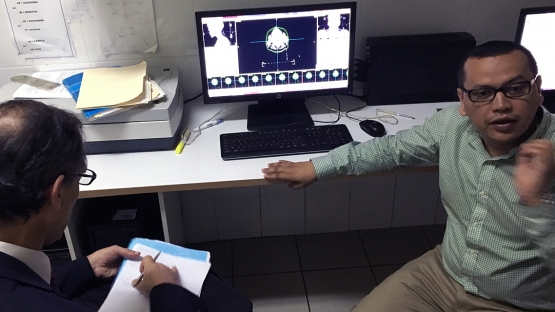Honduras is to revitalise its cancer control efforts after an IAEA assessment identified an urgent need for enhanced prevention, early detection and more skilled health professionals for its cancer care services.
The Honduran Ministry of Health's decision to meet the growing demand from cancer patients for treatment and services follows an IAEA imPACT review mission to Honduras in June 2016.
"We need to focus and increase our attention on cancer," said Edna Yolani Batres, Minister of Health, "we still have a lot to do to expand our capacities to ensure better access for cancer patients".
Honduras invited the IAEA mission to evaluate its current cancer control services and priorities. The assessment is one of a number of services the IAEA provides to its Member States to plan and implement efforts to tackle their cancer burden.
The imPACT review team was comprised of international cancer experts nominated by the IAEA, the World Health Organisation and the International Agency for Research on Cancer (IARC). The experts assessed all components of cancer control including registry, prevention and early detection, diagnosis, treatment and palliative care, as well as radiation safety, education and training. Institutions were evaluated at all levels of the health system and civil society both in the capital, Tegucigalpa, and in San Pedro Sula, the second largest city in the country.
The expert team recommended that the national cancer control unit be reopened following its closure during a restructure of the Ministry of Health in 2014. Once operational, the unit will work to strengthen the coordination and communication of cancer activities between public health intuitions, civil society and the public.
With just one residency programme on cancer in the country (specialising on surgical oncology), Honduras has currently only few trained cancer health professionals. Accordingly, the expert team recommended developing further residency programmes to encompass medical and radiation oncology, underlining the importance of building an oncology workforce covering the many areas of cancer control.
Other recommendations focused on the prevention and early detection of cervical cancer. Despite a long-term screening programme being conducted by the country since 1997, cervical cancer is causing the highest number of cancer related deaths amongst women in Honduras, according to 2012 estimates by IARC.
Further to the Ministry of Health's commitment to address cancer in a comprehensive way, Dr Francis Contreras, the Vice Minister, said that "we need to ensure we can maximise our response to cancer with the resources available".
In addition to the ImPACT Missions, the IAEA Programme of Action for Cancer Therapy (PACT) supports IAEA Member States through a variety of services including capacity building and training for cancer control specialists and mobilizes resources to support the expansion of cancer services.


